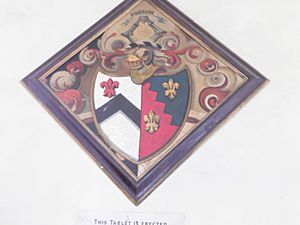Andrew Riccard facts for kids
Sir Andrew Riccard (born around 1604 – died September 6, 1672) was an English merchant and politician. He was a member of the Parliament in 1654.
Contents
Who Was Sir Andrew Riccard?
Sir Andrew Riccard was born in a village called Portesham. His father was Walter Riccard. Andrew married Catherine, whose father was a successful merchant. They had a daughter named Christiana. She later married two important lords. Andrew then married Susanna Bateman.
When he was about 30, Riccard was rich enough to get his own special family symbol, called a coat of arms. It had a "Saracen's head" wearing a turban, which showed his trade connections with eastern countries. His motto was "Possum," which means "I am able" in Latin. This was also the common name for his home village, Portesham.
Riccard bought the manor of Portesham. After he died, it went to his daughter. He was very kind to the people living in Portesham. He gave many of his tenants the right to own their land freely. This made them more independent. People remembered him for his generosity. You can still see his family's special shield, called a hatchment, in St Peter's Church, Portesham.
Sir Andrew and the English Civil War
During the time of the English Civil War, Sir Andrew Riccard supported the King (he was a Royalist). He joined other merchants to sign papers against some of the things Parliament was doing. However, he mostly stayed out of politics. He focused on his business instead.
A Successful Merchant and Leader
Sir Andrew Riccard became a very successful businessman. He owned many ships and even rented them out to traders from Venice. In 1646, he joined the committee of the East India Company. This company traded with countries in Asia. Four years later, he became the treasurer of the Levant Company, which traded with countries in the eastern Mediterranean.
He was also an important leader in the City of London. He became an Alderman and was the Sheriff of London in 1651. In 1653, he was the master of the Drapers’ Company, a group for cloth merchants. In 1654, he became the Governor of the Levant Company, a job he held for 18 years! He was also Governor of the East India Company at different times.
Because of his success, he was chosen to be a Member of Parliament for the City of London in 1654. After King Charles II returned to power, he made Andrew Riccard a knight on July 10, 1660.
A Small Problem
In 1668, Sir Andrew had a disagreement that was discussed in the House of Lords. He was threatened with being sent to the Tower of London. Luckily, he avoided that. He was held for a few days but was soon released.
His Legacy and Death
Sir Andrew Riccard died when he was about 68 years old. After his death, the Turkey Company (another name for the Levant Company) built a monument for him. It included a full-size statue in St Olave’s church.
The words on his monument say that he was a very honest and smart merchant. It mentions that he was often chosen to lead the East India Company and the Turkey Company. He was known for his love for God and his kindness to people. One special act of generosity was that he left the right to choose the church's priest to five of the oldest people in the parish. He died on September 6, 1672.
Images for kids
 | Sharif Bey |
 | Hale Woodruff |
 | Richmond Barthé |
 | Purvis Young |



